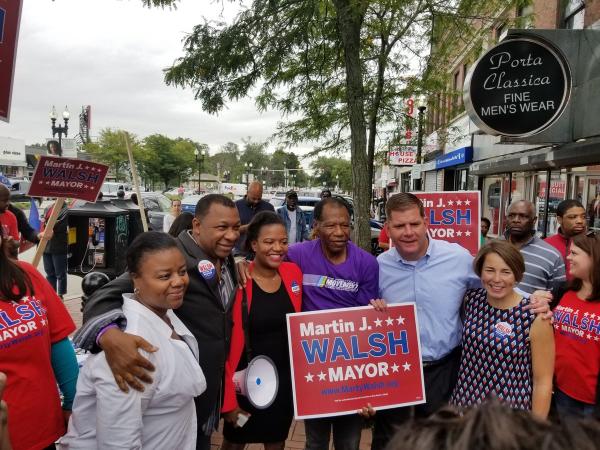October 24, 2017

Sheriff Steven Tompkins and state Sen. Linda Dorcena Forry (second and third from left) join Mayor Martin Walsh at a September campaign rally in Mattapan. Forry Twitter photo
News Editor’s note: The Boston branch of the NAACP last week released a report three years in the making, which sharply critiqued the Walsh administration’s progress toward addressing issues of racial inequity in Boston. It graded the administration harshly in key areas of education, economic development, public safety, and staffing diversity.
State Sen. Linda Dorcena Forry and Suffolk County Sheriff Steven Tompkins, both elected representatives of color who have endorsed Walsh, submitted the following op-ed in response to the NAACP report.
Mayor Walsh is working to move Boston forward
For years, we have known Mayor Marty Walsh as a compassionate friend, a courageous leader, and a strong ally to communities of color. From his personal conversations with families healing from trauma, to standing up before the Chamber of Commerce and naming racism as the number one challenge facing our nation and our city, he has shown time and again that he gets it.
Having vocal leaders matters, but it’s even more critical that we elect leaders who take action. In 2011, three years before he took office, Marty Walsh created Building Pathways, a program that provides people of color and women direct access to good careers in the building trades. He acted then, and he’s acting now.
As mayor, Marty Walsh has used a variety of tools at his disposal to make historic change in our city. In our schools, financial investments and graduation rates are the highest they’ve ever been, and for the first time all three of Boston’s exam schools are led by people of color. BPS employs 6 percent of all teachers in Massachusetts, but accounts for 52 percent of the state’s black teachers. In the 2015-16 school year, 37 percent of BPS teachers were people of color, far above the national average of 28 percent for large urban areas. Early data from the spring 2017 season indicates that this will be the best year in recent BPS history for hiring black and Latino teachers. The mayor’s commitment to a diverse teaching pool has made Boston a national model for urban school districts across the country.
In City Hall, he has appointed the most diverse cabinet in the city’s history, and 45 percent of all new hires have been people of color.
The Boston Police Department now has the most racially diverse command staff in its history, a change with real impact. Police Academy Superintendent Lisa Holmes has instituted training in unconscious bias and de-escalation, helping to make Boston a national leader in building trust between police and the community. Although more work needs to be done addressing diversity throughout the department, the revamped cadet program is more than 70 percent diverse.
Mayor Walsh has facilitated an honest conversation throughout the city about racism that impacts our communities through a series of race dialogues – the first city-sponsored meetings of its kind in Boston. He shares the goals of the NAACP, which is why his track record on increasing equity, access, and opportunity for communities of color in our city is unparalleled.
The NAACP report card serves as a blueprint for continued discussion between city hall and communities of color on diversity, employment and job training programs, education, housing and economic access, and public safety. We respect the association’s intent and appreciate the joint discussions that have taken place to date between the NAACP and City Hall. We believe these shared discussions will continue to foster the positive change desired by Mayor Walsh, the NAACP, and communities of color.
The report card can also serve as a challenge to all leaders in elected office, in community groups, and those who are new to civic engagement to partner more closely with City Hall to leverage the resources available to empower and uplift our diverse neighbors.
Sustained dialogues will produce the action steps needed to inspire the city’s residents to use the newly opened business centers in East Boston and Mattapan; they will connect more entrepreneurs to the Roxbury Innovation Center and Office of Financial Empowerment, both located in the heart of Dudley Square; and they will drive job seekers to the city’s Office of Diversity to participate in job fairs, resume review sessions, and training opportunities. Further, connecting more young people to My Brother’s Keeper and the mayor’s Mentoring Movement offers them the opportunity to express their views on the future direction of the city. The professional mentoring and coaching they receive will help produce the next wave of Boston leaders.
Mayor Walsh has made an earnest and enduring effort in his first term to help improve the lives of all the city’s residents. His policies and programs are lifting up low- and moderate- income families; they are integrating foreign born individuals seeking a better life; and they are enriching education for the children of our great city.
We know Marty Walsh as a longtime ally of our communities. And we know Mayor Walsh is a sincere and committed advocate for strengthening families and neighborhoods as he has implemented strategies to aid the citizens of Boston in realizing their ability to achieve the American Dream.
Linda Dorcena Forry is the state senator representing the 1st Suffolk District. [News Editor’s note: Sen. Forry is married to Reporter publisher Bill Forry.] Steven Tompkins is the sheriff of Suffolk County.
Topics:


